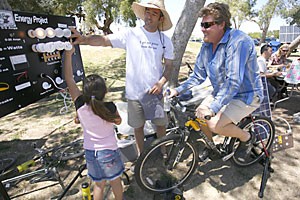UA students and faculty held an event Saturday as part of a national petition to Congress to cut carbon dioxide emissions.
Step It Up 2007: Cut Carbon 80 Percent by 2050 was held in more than 1,400 cities across the nation as a way to urge Congress to prevent global warming in a collaborative event as large as the first Earth Day in 1970, according to the Step It Up Web site.
The event drew about 20 million people across the nation, according to the U.S. Department of State’s Web site.
Tucson’s own Step It Up 2007 event was held at Himmel Park and brought together local bands and businesses, speakers and nonprofit organizations in an event called Solar Rock, where everything from the microphones to the amps was powered by solar panels provided by local business The Solar Store.
Eight bands and six speakers shared the stage throughout the day, providing entertainment and information.
Speakers talked about the current issues of global warming in regard to the Southwest, steps that can be taken to prevent climate change and the consequences of global warming.
Speakers who attended included Joaquin Ruiz, dean of the College of Science, Arizona Democratic Rep. Steve Farley and U.S. Rep. Raǧl Grijalva, D-Ariz.
Grijalva said cutting carbon dioxide emissions is a matter of urgency and survival.
“”This has been an important issue to me for a long time,”” he said. “”We have a small window of opportunity to prevent disastrous (environmental) scenarios.””
Other speakers hoped the event would bring change.
“”This is the kind of thing we need,”” said Melanie Lenart, one of the speakers and a UA research associate in the Arizona Research Labs. “”But the change won’t happen overnight. It’s kind of like driving a huge semi; when you put on the brakes, it takes a while, and right now, we are still speeding up.””
Ruiz said he hopes the issue becomes a political movement to increase the funding in science and engineering fields to prevent climate change.
“”The best thing to happen to this country was the Supreme Court’s decision on the (Environmental Protection Agency),”” Ruiz said in reference to an April 2 ruling requiring the EPA to more tightly regulate carbon dioxide emissions.
Richard Rushforth, an environmental sciences senior and organizer of Step It Up Tucson, said the event was a new kind of political rally.
“”Instead of all of us marching down to Washington, we are holding it in our neighborhoods, communities and the places that we love,”” Rushforth said. “”It’s a different way to look at political action.””
Local businesses and nonprofit organizations also displayed alternative energy solutions, like solar power, and provided information on different ways to prevent global warming.
ECOalition, a student club on campus, set up an environmental game show and provided information on different ways to help the environment.
“”This is a great way to do something like this because a concert venue is perfect for people to just hang out,”” said Prabjit Virdee, a psychology senior and president of ECOalition.
Emilie Duisberg, an anthropology senior and organizer of Step It Up Tucson, said people in America are waking up to the reality of greenhouse gas emissions.
“”This is a pretty scary thing, and we need to do something about it,”” Duisberg said.
Planning for the event started in January when Duisberg found out about the event and wanted to hold it at Himmel Park.
She was not the only one pursuing the event, however, as she soon found out that Lisa Dollinger, an adjunct lecturer in chemistry, had also looked into holding the event at the same place.
“”Once we started working on it together, it really started rolling,”” Dollinger said. “”It’s been great working with them; they’re amazing.””
The Food Conspiracy Co-op, 412 N. Fourth Ave., also organized and sponsored the event.
“”This is the critical issue of our time and it was something we wanted to make as big and successful as possible,”” said Torey Ligon, outreach coordinator for the Food Conspiracy Co-op.
Proceeds from the event will be used to purchase carbon offsets, which construct renewable energy to offset the carbon dioxide released by people who drove to the event.









